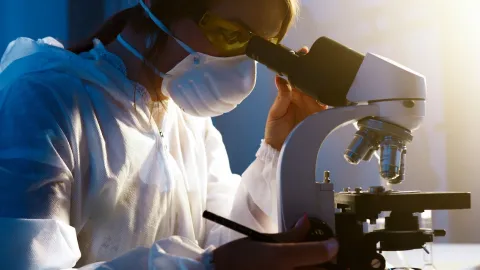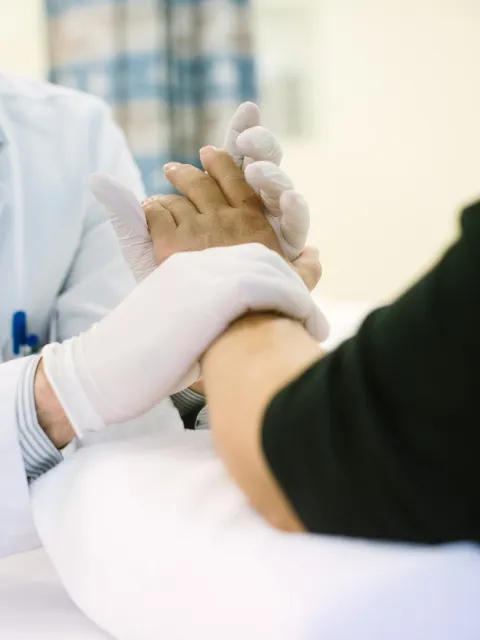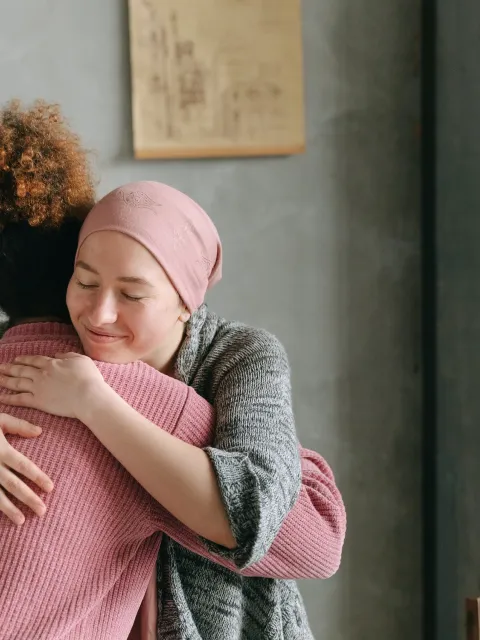Cancer beyond COVID-19: Bringing quality cancer care closer to patients
The second UICC Virtual Dialogue in the Cancer beyond COVID-19 series looked at the lessons learned during the pandemic that can help transform outdated systems into more efficient, patient-centred models of care.

Changes in health service delivery that were beginning to take place before the pandemic, such as telemedicine, have accelerated exponentially in the past few months. Many non-clinical services are being conducted virtually or have moved to community settings, while clinical care, when not delayed, is shifting to less intensive therapies and a greater consideration of alternative treatments to reduce hospital visits.
To examine in more detail how well-entrenched and outdated health systems are being challenged and transformed, UICC assembled a high-level panel for its second Virtual Dialogue in the three-part series on “Cancer beyond COVID-19”: Dr Rifat Atun, Professor of Global Health Systems at Harvard University; Philippe Drouet, Senior Vice President of Oncology Global Marketing and Market Access at MSD; Dr Miriam Mutebi, Consultant and Breast Cancer Surgical Oncologist at Aga Khan University Hospital in Kenya; and Dr María del Rocío Sáenz, former Minister of Health and Coordinator for the Permanent Forum on Cancer in Women in Costa Rica. The session was moderated by Dr Kirstie Graham, Director of Capacity Building at UICC.
Addressing the exposed fragility of health systems
The first observation Dr Atun made was how unprepared health systems proved to be globally in the face of the pandemic. “In many places, the response to cancer care as part of the response to COVID-19 has been ineffective, inefficient and inequitable,” he said. Even in North America, Latin America and Europe where health systems are generally successful and high-performing, responsiveness has been inadequate.
“Our health systems have been long in decline and I think we knew that, but we have not been honest enough to discuss this. The sheer magnitude of the underperformance, however, has been unmasked by COVID-19.”
– Dr Rifat Atun, Professor of Global Health Systems at Harvard University
Dr Atun pointed to a study on “Sustainable care for children with cancer” in The Lancet Oncology earlier this year, which revealed that approximately 45% of the estimated 13.7 million new cases of childhood cancer globally will remain undiagnosed at current levels of health system performance, including access and referral. This, along with huge discrepancies in survival rates between high- and lower-income countries, underscores the systemic failure to even diagnose many cases of cancer in children.
He stated that change was possible, however, and that scaling up strategic interventions such as chemotherapy, radiotherapy, surgery and interventions to improve adherence would lead to a sharp decline in annual deaths and a noted improvement in five-year survival rates. “The cost of this would be around 590 billion dollars but the net benefit is huge, two trillion dollars in the period 2020-2050.”
Philippe Drouet emphasised that, to benefit fully from technological and other innovations that are emerging in response to the pandemic, “it is important to get the fundamentals right” and transform how health systems function. He said there was a need to build a more robust workforce, stating that in many countries there is no more than 1 oncologist per 5,000 inhabitants, and invest in infrastructure to provide high-quality cancer services, citing the City Cancer Challenge as a positive example.
Philippe Drouet mentioned several times WHO’s “best buys” (Tackling NCDs: 'best buys' and other recommended interventions for the prevention and control of noncommunicable diseases), recommending it as an excellent starting point on how to focus resources and energy on some core aspects of cancer care.
“We need more money for cancer care but investments must be smart. It is important to be effective in our spending. We need to build the indicators that will enable us to learn from the past and make improvements for better performing health systems.”
– Dr María del Rocío Sáenz, former Minister of Health and Coordinator for the Permanent Forum on Cancer in Women in Costa Rica
Dr Miriam Mutebi provided insight into the situation in Sub-Saharan Africa and, in this case, the positive developments that were taking place pre-COVID-19. “We have witnessed an exponential increase in awareness about cancer and in the implementation of national cancer control plans. In places such as Kenya, Rwanda and Ethiopia, for example, there has been a drive to expand services to incorporate cancer care and move towards Universal Health Coverage (UHC).”
She noted also, however, the significant downstream effects of COVID-19. She cited not only interruptions of care and patients' fear or inability to travel for treatment or diagnosis, but also the fact that their ability to pay for care has been seriously affected. It is therefore all the more important to maintain the drive towards UHC.
“We need to “choose wisely” to minimise harmful and wasteful practices that are particularly problematic when resources are limited. How do we prioritise? We have to think creatively. Yes, innovations are great but they are not a band-aid for dysfunctional systems. They have to go hand-in-hand with strengthening the system."
– Dr Miriam Mutebi, Consultant and Breast Cancer Surgical Oncologist at Aga Khan University Hospital in Kenya, Member of the UICC Board of Directors
Hearing and integrating patients’ voices
A primary concern now in the response to the pandemic is maintaining contact with patients and strengthening patient navigation systems. Dr María del Rocío Sáenz also stressed the importance of hearing the patient voice, not only at the level of the clinician who determines the most appropriate course of care for the individual, but also at the system level to better shape how cancer care is delivered.
Dr María del Rocío Sáenz highlighted a new programme in Costa Rica, which engages women who have been diagnosed with breast cancer and those who have survived, to build a knowledge base of patient experience and give voice to that experience and empower patients. Now, in response to the pandemic, she said rehabilitation teams are building protocols and guidelines on how to tailor rehabilitation for patients at home, develop the necessary technology, train professionals and patients – and provide internet connection and smartphones to those who need them. “Innovations should not create new inequities,” she said.
Telemedicine and other virtual platforms that are providing remote access to care, including psychosocial support, have been among the more visible and rapidly implemented innovations to arise in response to the pandemic. And while it is difficult to replicate person-to-person contact in a virtual environment, feedback from patients has been generally positive.
In a survey cited by Dr Kirstie Graham, 90% patients reported that they considered virtual care as good or better than before, at least in higher-income countries. The report states that “patients appreciated the more personalised interactions, the faster response time, and the convenience of being able to manage and monitor their care from home.” Many expressed the desire to use virtual care and communications after the pandemic ends.
Dr Mutebi said that in Sub-Saharan Africa stigma existed around certain types of care, particularly with respect to mental health and therefore psychological support; in this regard also, many patients welcome remote counselling, which allows them to avoid being seen consulting. “This is definitely one of those practices that we need to maintain irrespective of what is going on,” Dr Mutebi said. “Creating greater dialogue with patients in the future can go a long way to optimising care.”
Panellists at UICC’s Virtual Dialogue also reported that patients felt that doctors had more time for them in consultations and appointments were easier to fix. They noted, however – and participants in the Virtual Dialogue concurred – that one area where remote connection could not replace in-person contact was for end-of-life care.
Artificial intelligence, greater collaborations and other developments that are here to stay
This UICC Virtual Dialogue on bringing quality cancer care closer to patients also touched upon how the crisis is accelerating progress in a number of areas. Dr Atun cited in particular new diagnostics and therapeutics, remote diagnostics and care, personalised care, big data and artificial intelligence (AI), conversational agents or computerised dialogue systems, and the ability to monitor real-time data.
Philippe Drouet detailed the use of Artificial intelligence (AI), for instance to analyse data in patients’ electronic examination results, increasing the ability to identify and treat disease earlier.
“Artificial intelligence looks for patterns, which data points indicate increased risk for certain cancer types based on a combination of factors in a patient’s charts. It gives treating oncologists pathways for further investigation into risk assessment and additional testing. Such systems should be ready to roll out within a few years.”
– Philippe Drouet, Senior Vice President of Oncology Global Marketing and Market Access at MSD
Dr Miriam Mutebi highlighted advances in lower-resourced settings, in particular the interest in developing telepathology services and the remote transmission of data for diagnostics and pattern recognition, and using virtual reality and simulated surgery for training and educational purposes to improve surgical skills. There has also been work around the development and implementation of NCCN harmonised guidelines for Sub-Saharan Africa, involving ongoing work with IBM.
In addition to technological advances, Philippe Drouet stressed the importance of collaboration and how the pandemic has shown what is possible when there is a sense of united purpose and urgency. He cited as an example MSD’s development of a new formulation for one of its cancer medications that required fewer hospital visits (one every six weeks rather than one every three weeks) with the same results for the patient – a notable benefit in the time of COVID-19. “The regulators played the game and we received approval by the US Food and Drug Administration within three days, the fastest we have ever seen,” he said.
He went on to emphasise how the move towards virtual exchanges is also enabling a more democratic and widespread dissemination of scientific knowledge, when previously it might have been restricted to conferences attended only by those who could afford to do so. Creative collaboration between research centres, regulators and practitioners provide the means to overcome traditional barriers to innovation and bring new solutions to cancer patients within a very short time.
Referring back to the need to address fundamental weaknesses in health systems, Dr Mutebi spoke about leveraging existing collaborations that have emerged with COVID-19 to look into critical aspects of cancer control and addressing patient literacy so that everyone can employ and benefit from new tools and advances in care. “We need to empower them,” she said, “so they can also advocate for change.”
In the productive Q&A that followed, participants provided input from their own experiences, mirroring or complementing what had been said by the panellists. Dr Atun summarised the “4 Ps” for a better future for cancer care: People, Partnerships, Platforms and Policies. Indeed, a significant point made was the need to engage and inform policymakers, to gain support from decision-makers and generate a sense of urgency in cancer care. There must be the political will to drive and endorse fundamental changes and innovations.
Discover the first Virtual Dialogue in the Cancer beyond COVID-19 series on "Reimagining cancer screening and diagnosis in the COVID-19 era."
Register for the third Virtual Dialogue on 1st December.
You may also read about the experiences and responses of UICC member organisations to the pandemic at “UICC’s response to COVID-19.”
For more information on cancer care during the coronavirus pandemic, visit UICC’s "Cancer and coronavirus resources" page.
“We need more money for cancer care but investments must be smart. It is important to be effective in our spending. We need to build the indicators that will enable us to learn from the past and make improvements for better performing health systems.”
– Dr María del Rocío Sáenz, former Minister of Health and Coordinator for the Permanent Forum on Cancer in Women in Costa Rica
Last update
Tuesday 08 December 2020
